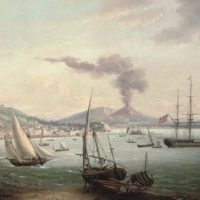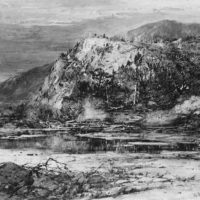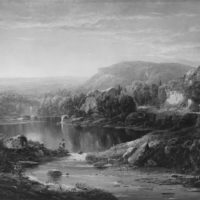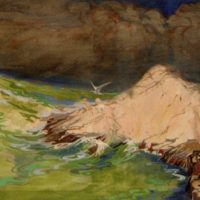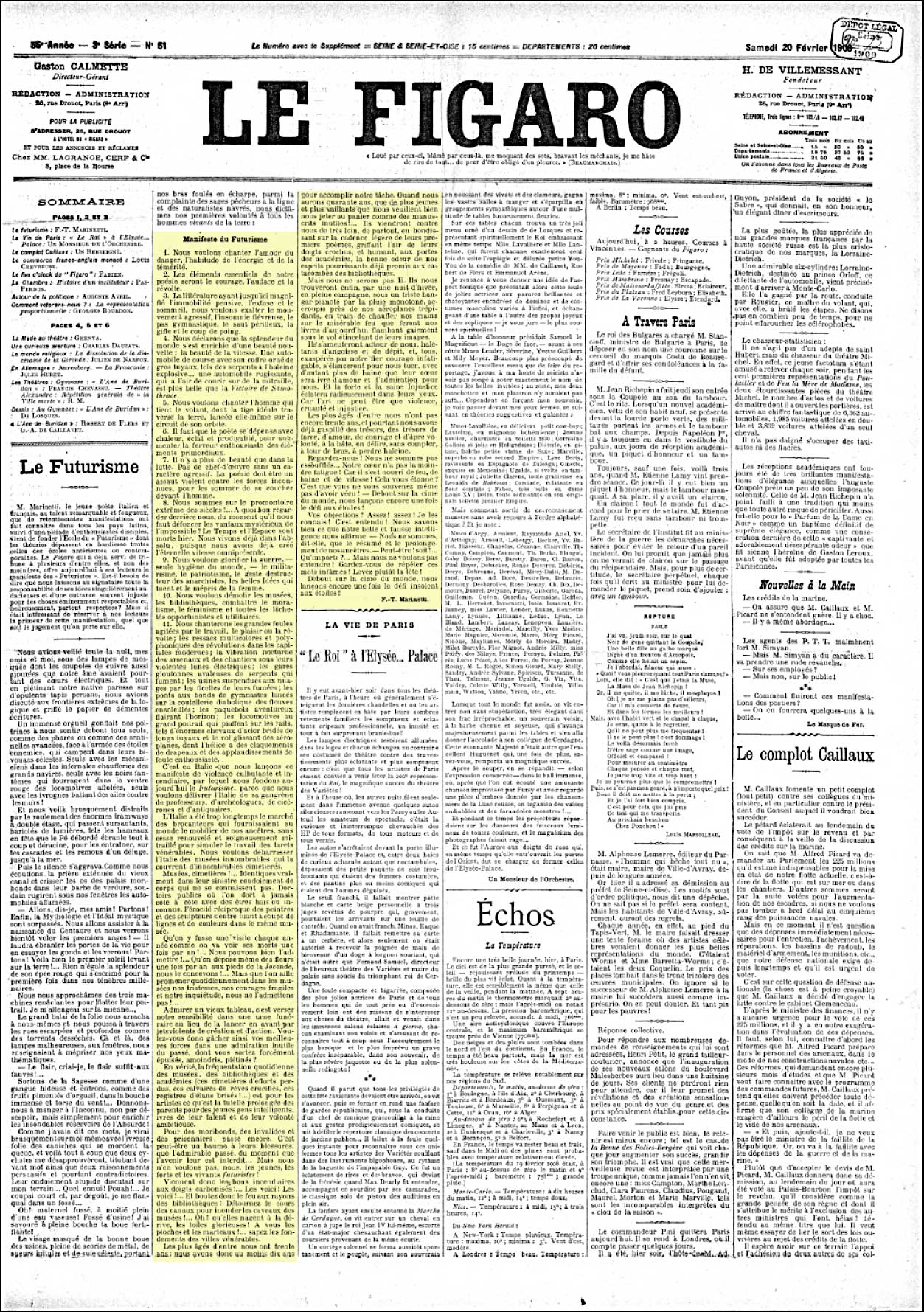Writer of the Manifesto: Filippo Tommaso Marinetti
Published: 5th February, 1909 in Italian newspaper Gazzetta dell’Emilia in Bologna, 20th February, 1909 in French newspaper Le Figaro as Manifeste du futurism.
Original Language: French
Famous painters of the movement:
- Umberto Boccioni
- Carlo Carra
- Gino Severini
Famous Artworks:
- The City Rises by Umberto Boccioni
- Abstract Speed + Sound by Giacomo Balla
Futurism Definition
According to the Oxford dictionary,
“An artistic movement begun in Italy in 1909, which strongly rejected traditional forms and embraced the energy and dynamism of modern technology. Launched by Filippo Marinetti, it had effectively ended by 1918 but was widely influential, particularly in Russia on figures such as Malevich and Mayakovsky.”
It is a comprehensive definition covering the beginning and the end of the futurism movement. Though, as it is said there, in Russia the effects of Futurism had prolonged even after its demise in European countries. The Russian Revolution of 1917 triggered the decline of Futurism in Russian as many futurist artists died, migrated to other new art movements or left the country.
The core of Futurism was to remove the influence the past, particularly conventional ethics from art and focus on the more bold, modern and futuristic ideas such as youth, machines, technology and even violence. Also the World War I could be accused for the art-movement’s premature death.
Futurism Origin
The Futurism manifesto was initially written by the Italian poet Filippo Tommaso Marinetti. He is called as the founder of the movement. After writing the manifesto, he first published it in the Italian newspaper, Gazzetta dell’Emilia on the day of 5th February, 1909. Fifteen days later, on 20th February he published it in the French newspaper, Le Figaro as Manifeste du futurism.
After the Manifesto’s release in prominent newspapers, Marinetti came into limelight and was reviewed for his new art movement. The manifesto stayed as one of his most important (probably the most important) work throughout his life. Even today, he is known as the writer of the Futurist manifesto.
As we can presume his distaste for the conventional ethics of arts, in the manifesto he has included pretty radical declarations.
As being a poet, relating to the literary subjects, the manifesto speaks in form of poems and writing. Though, as it always happens in art-community, any manifesto decreed by an artist, whether he is a writer, poet, painter, sculpture, etc., the philosophy and the core message of the manifesto migrates to the other art forms and merges in the new art form after adopting the required changes. Actually, many manifestos have been written by the poets or writers only. They were the initiators of the new philosophies and movements in the art-world.
Futurist Manifesto
As said above, the manifesto was originally published in an Italian and then a French newpaper. Here we have presented the English version:
We have been up all night, my friends and I, beneath mosque lamps whose brass cupolas are bright as our souls, because like them they were illuminated by the internal glow of electric hearts. And trampling underfoot our native sloth on opulent Persian carpets, we have been discussing right up to the limits of logic and scrawling the paper with demented writing. Our hearts were filled with an immense pride at feeling ourselves standing quite alone, like lighthouses or like the sentinels in an outpost, facing the army of enemy stars encamped in their celestial bivouacs. Alone with the engineers in the infernal stokeholes of great ships, alone with the black spirits which rage in the belly of rogue locomotives, alone with the drunkards beating their wings against the walls. Then we were suddenly distracted by the rumbling of huge double decker trams that went leaping by, streaked with light like the villages celebrating their festivals, which the Po in flood suddenly knocks down and uproots, and, in the rapids and eddies of a deluge, drags down to the sea. Then the silence increased. As we listened to the last faint prayer of the old canal and the crumbling of the bones of the moribund palaces with their green growth of beard, suddenly the hungry automobiles roared beneath our windows. “Come, my friends!” I said. “Let us go! At last Mythology and the mystic cult of the ideal have been left behind. We are going to be present at the birth of the centaur and we shall soon see the first angels fly! We must break down the gates of life to test the bolts and the padlocks! Let us go! Here is they very first sunrise on earth! Nothing equals the splendor of its red sword which strikes for the first time in our millennial darkness.” We went up to the three snorting machines to caress their breasts. I lay along mine like a corpse on its bier, but I suddenly revived again beneath the steering wheel — a guillotine knife — which threatened my stomach. A great sweep of madness brought us sharply back to ourselves and drove us through the streets, steep and deep, like dried up torrents. Here and there unhappy lamps in the windows taught us to despise our mathematical eyes. “Smell,” I exclaimed, “smell is good enough for wild beasts!” And we hunted, like young lions, death with its black fur dappled with pale crosses, who ran before us in the vast violet sky, palpable and living. And yet we had no ideal Mistress stretching her form up to the clouds, nor yet a cruel Queen to whom to offer our corpses twisted into the shape of Byzantine rings! No reason to die unless it is the desire to be rid of the too great weight of our courage! We drove on, crushing beneath our burning wheels, like shirt-collars under the iron, the watch dogs on the steps of the houses. Death, tamed, went in front of me at each corner offering me his hand nicely, and sometimes lay on the ground with a noise of creaking jaws giving me velvet glances from the bottom of puddles. “Let us leave good sense behind like a hideous husk and let us hurl ourselves, like fruit spiced with pride, into the immense mouth and breast of the world! Let us feed the unknown, not from despair, but simply to enrich the unfathomable reservoirs of the Absurd!” As soon as I had said these words, I turned sharply back on my tracks with the mad intoxication of puppies biting their tails, and suddenly there were two cyclists disapproving of me and tottering in front of me like two persuasive but contradictory reasons. Their stupid swaying got in my way. What a bore! Pouah! I stopped short, and in disgust hurled myself — vlan! — head over heels in a ditch. Oh, maternal ditch, half full of muddy water! A factory gutter! I savored a mouthful of strengthening muck which recalled the black teat of my Sudanese nurse! As I raised my body, mud-spattered and smelly, I felt the red hot poker of joy deliciously pierce my heart. A crowd of fishermen and gouty naturalists crowded terrified around this marvel. With patient and tentative care they raised high enormous grappling irons to fish up my car, like a vast shark that had run aground. It rose slowly leaving in the ditch, like scales, its heavy coachwork of good sense and its upholstery of comfort. We thought it was dead, my good shark, but I woke it with a single caress of its powerful back, and it was revived running as fast as it could on its fins. Then with my face covered in good factory mud, covered with metal scratches, useless sweat and celestial grime, amidst the complaint of staid fishermen and angry naturalists, we dictated our first will and testament to all the living men on earth. MANIFESTO OF FUTURISM We want to sing the love of danger, the habit of energy and rashness. The essential elements of our poetry will be courage, audacity and revolt. Literature has up to now magnified pensive immobility, ecstasy and slumber. We want to exalt movements of aggression, feverish sleeplessness, the double march, the perilous leap, the slap and the blow with the fist. We declare that the splendor of the world has been enriched by a new beauty: the beauty of speed. A racing automobile with its bonnet adorned with great tubes like serpents with explosive breath … a roaring motor car which seems to run on machine-gun fire, is more beautiful than the Victory of Samothrace. We want to sing the man at the wheel, the ideal axis of which crosses the earth, itself hurled along its orbit. The poet must spend himself with warmth, glamour and prodigality to increase the enthusiastic fervor of the primordial elements. Beauty exists only in struggle. There is no masterpiece that has not an aggressive character. Poetry must be a violent assault on the forces of the unknown, to force them to bow before man. We are on the extreme promontory of the centuries! What is the use of looking behind at the moment when we must open the mysterious shutters of the impossible? Time and Space died yesterday. We are already living in the absolute, since we have already created eternal, omnipresent speed. We want to glorify war — the only cure for the world — militarism, patriotism, the destructive gesture of the anarchists, the beautiful ideas which kill, and contempt for woman. We want to demolish museums and libraries, fight morality, feminism and all opportunist and utilitarian cowardice. We will sing of the great crowds agitated by work, pleasure and revolt; the multi-colored and polyphonic surf of revolutions in modern capitals: the nocturnal vibration of the arsenals and the workshops beneath their violent electric moons: the gluttonous railway stations devouring smoking serpents; factories suspended from the clouds by the thread of their smoke; bridges with the leap of gymnasts flung across the diabolic cutlery of sunny rivers: adventurous steamers sniffing the horizon; great-breasted locomotives, puffing on the rails like enormous steel horses with long tubes for bridle, and the gliding flight of aeroplanes whose propeller sounds like the flapping of a flag and the applause of enthusiastic crowds. It is in Italy that we are issuing this manifesto of ruinous and incendiary violence, by which we today are founding Futurism, because we want to deliver Italy from its gangrene of professors, archaeologists, tourist guides and antiquaries. Italy has been too long the great second-hand market. We want to get rid of the innumerable museums which cover it with innumerable cemeteries. Museums, cemeteries! Truly identical in their sinister juxtaposition of bodies that do not know each other. Public dormitories where you sleep side by side for ever with beings you hate or do not know. Reciprocal ferocity of the painters and sculptors who murder each other in the same museum with blows of line and color. To make a visit once a year, as one goes to see the graves of our dead once a year, that we could allow! We can even imagine placing flowers once a year at the feet of the Gioconda! But to take our sadness, our fragile courage and our anxiety to the museum every day, that we cannot admit! Do you want to poison yourselves? Do you want to rot? What can you find in an old picture except the painful contortions of the artist trying to break uncrossable barriers which obstruct the full expression of his dream? To admire an old picture is to pour our sensibility into a funeral urn instead of casting it forward with violent spurts of creation and action. Do you want to waste the best part of your strength in a useless admiration of the past, from which you will emerge exhausted, diminished, trampled on? Indeed daily visits to museums, libraries and academies (those cemeteries of wasted effort, calvaries of crucified dreams, registers of false starts!) is for artists what prolonged supervision by the parents is for intelligent young men, drunk with their own talent and ambition. For the dying, for invalids and for prisoners it may be all right. It is, perhaps, some sort of balm for their wounds, the admirable past, at a moment when the future is denied them. But we will have none of it, we, the young, strong and living Futurists! Let the good incendiaries with charred fingers come! Here they are! Heap up the fire to the shelves of the libraries! Divert the canals to flood the cellars of the museums! Let the glorious canvases swim ashore! Take the picks and hammers! Undermine the foundation of venerable towns! The oldest among us are not yet thirty years old: we have therefore at least ten years to accomplish our task. When we are forty let younger and stronger men than we throw us in the waste paper basket like useless manuscripts! They will come against us from afar, leaping on the light cadence of their first poems, clutching the air with their predatory fingers and sniffing at the gates of the academies the good scent of our decaying spirits, already promised to the catacombs of the libraries. But we shall not be there. They will find us at last one winter’s night in the depths of the country in a sad hangar echoing with the notes of the monotonous rain, crouched near our trembling aeroplanes, warming our hands at the wretched fire which our books of today will make when they flame gaily beneath the glittering flight of their pictures. They will crowd around us, panting with anguish and disappointment, and exasperated by our proud indefatigable courage, will hurl themselves forward to kill us, with all the more hatred as their hearts will be drunk with love and admiration for us. And strong healthy Injustice will shine radiantly from their eyes. For art can only be violence, cruelty, injustice. The oldest among us are not yet thirty, and yet we have already wasted treasures, treasures of strength, love, courage and keen will, hastily, deliriously, without thinking, with all our might, till we are out of breath. Look at us! We are not out of breath, our hearts are not in the least tired. For they are nourished by fire, hatred and speed! Does this surprise you? it is because you do not even remember being alive! Standing on the world’s summit, we launch once more our challenge to the stars! Your objections? All right! I know them! Of course! We know just what our beautiful false intelligence affirms: “We are only the sum and the prolongation of our ancestors,” it says. Perhaps! All right! What does it matter? But we will not listen! Take care not to repeat those infamous words! Instead, lift up your head! Standing on the world’s summit we launch once again our insolent challenge to the stars. Sources: Image from: http://thesefantasticworlds.com/ Manifesto from: http://vserver1.cscs.lsa.umich.edu/